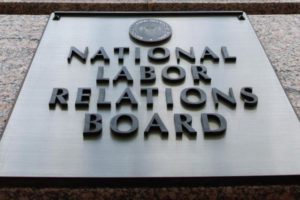
On July 26, the NLRB signed an MOU with the Justice Department’s Antitrust Division with the intent “to better protect free and fair labor markets and ensure that workers can freely exercise their rights under the National Labor Relations Act (NLRA),” the NLRB stated. Both agencies share an interest in promoting the free flow of commerce and fair competition in labor markets, including through protecting U.S. workers from collusive or anticompetitive employer practices and unlawful interference with employees’ right to organize, the agency stated.
“Under the NLRA, workers have the right to organize to improve their pay and working conditions,” said NLRB General Counsel Jennifer Abruzzo. “When businesses interfere with worker organizing, either through creating structures designed to evade labor law or through anticompetitive practices, it hinders our economy and our democracy.”
“This MOU will strengthen the federal government’s ability to effectively stop this kind of unlawful activity, and therefore to better protect workers’ right to freely associate with one another to improve their wages and working conditions and to collectively bargain through freely chosen representatives,” Abruzzo added.
As explained by the NLRB, the collaboration with the Justice Department’s Antitrust Division “will focus on protecting workers who have been harmed or may be at risk of being harmed as a result of conduct designed to evade legal obligation and accountability,” such as:
- Misclassifying employees or fissuring workplaces;
- Interference with worker rights to obtain fair market compensation and collectively bargain (through labor market concentration/labor monopsony or other anticompetitive practices); and
- Imposing restrictive agreements or workplace rules, such as noncompete, no-solicitation, and nondisclosure provisions.
“Through greater coordination in information-sharing, enforcement activity and training, the agencies will maximize the enforcement of federal laws,” the NLRB stated. This includes the NLRA, under the NLRB’s jurisdiction and the antitrust laws enforced by the Justice Department’s Antitrust Division.
“By cooperating more closely with our colleagues in the NLRB, we can share information on potential violations of the antitrust and labor laws, collaborate on new policies, and ensure that workers are protected from collusion and unlawful employer behavior,” said Assistant Attorney General Jonathan Kanter.
FTC partnership
On July 19, the NLRB signed an MOU with the Federal Trade Commission forming a partnership between the agencies intended to promote fair competition and advance workers’ rights. “The agreement enables the NLRB and FTC to closely collaborate by sharing information, conducting cross-training for staff at each agency, and partnering on investigative efforts within each agency’s authority,” the NLRB stated.
“This MOU is critical to advancing a whole-of-government approach to combating unlawful conduct that harms workers,” Abruzzo stated.
“This agreement will help deepen our partnership with NLRB and advance our shared mission to ensure that unlawful business practices aren’t depriving workers of the pay, benefits, conditions, and dignity that they deserve,” said FTC Chair Lina Khan.
Areas of mutual interest between the two agencies identified by the MOU include:
- Labor market developments relating to the “gig economy” such as misclassification of workers and algorithmic decision-making;
- The imposition of one-sided and restrictive contract provisions, such as noncompete and nondisclosure provisions;
- The extent and impact of labor market concentration; and
- The ability of workers to act collectively.
The NLRB also recently joined the FTC’s Consumer Sentinel Network (CSN), an investigative online tool and complaint database for law enforcement agencies. The CSN contains millions of consumer complaints about scams, identity theft, Do Not Call Registry violations, and more.
In February, Abruzzo issued a memorandum to all field offices, committing to working closely with other federal agencies to ensure the government co-functions and co-enforces all related laws in the most effective and efficient way to ensure workers are fully protected, while minimizing employers’ compliance burdens.

